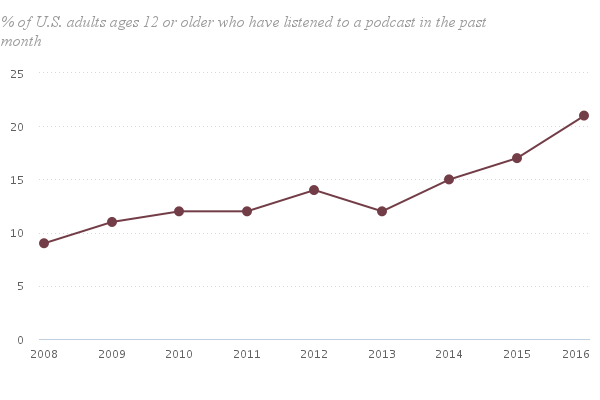 If you watch Jimmy Kimmel Live or any other late-night talk show for a week, you are sure to see a steady stream of actors showing clips from their latest movie and bands performing songs from their album that just dropped. Clearly these actors and bands understand the promotional value of tapping into a platform that has already created a large following in their target audience.
If you watch Jimmy Kimmel Live or any other late-night talk show for a week, you are sure to see a steady stream of actors showing clips from their latest movie and bands performing songs from their album that just dropped. Clearly these actors and bands understand the promotional value of tapping into a platform that has already created a large following in their target audience.
Marketers in the financial services industry should adopt a similar approach when it comes to promoting their white papers, research, and other forms of thought leadership. No, network talk shows like Kimmel aren’t looking to book a portfolio manager who can come on and talk about PE ratios or tax reform. But there is a forum that can be very valuable for financial brands: podcasts.
Why You Should Be Promoting Your White Paper
As we’ve written about previously regarding financial white papers, many companies make the mistake of having an “If you build it, they will come” attitude when it comes to their thought leadership. They think that as long as the paper is compelling, well-researched, and well-designed, readers will find it. Unfortunately, most companies that just post their white papers under the “Insights” page on their website find out that this isn’t the case.
To make sure that your white paper doesn’t suffer this fate, you need to think like a publicist and be proactive in getting your white paper in front of people who will value it. One of the best ways to do this is to leverage audiences that other people have already built in your target market. In the past, these efforts were called “public relations” and they typically involved pitching your idea to a reporter and hoping that the publication cited your work or quoted you in an upcoming article.
But as the media landscape has evolved, the opportunities for leveraging existing platforms to promote your content have expanded exponentially. And within this new landscape, podcasts have emerged as a powerful forum for getting the word out about your research.
Why Podcasts Are Great Ways to Distribute Your Content
Podcasting first gained popularity in the early 2000s, and it has enjoyed a renaissance over the past few years. According to the Pew Research Center, the percentage of Americans older than 12 who have listened to a podcast in the last month increased from 12% in 2013 to 21% in 2016.

Meanwhile, the number of podcasts has mushroomed. There are series focused on almost every topic imaginable. No matter how niche your interests are, there’s probably a podcast about it. This is great news for financial services firms looking to promote their white papers.
Just like actors go on the talk-show circuit to promote their new movies, financial white paper writers should go on the podcast circuit as guests to build awareness for their content.
Here are three reasons why being a podcast guest is such an effective strategy:
- Direct access to your target audience: Regardless of what your white paper is about, there’s a good chance you can find a podcast that covers it. Most podcasts cover very narrow, specific subjects, and this means that the audience is made up almost exclusively of people who are very interested in that topic. And these are exactly the people you want to be reaching.
For example, if you wrote a white paper about capital-raising trends for Internet of Things (IoT) companies, you could find countless podcasts about venture capital. Or you could come at it from a different angle and find podcasts about wearable technology. If you wrote a white paper about pricing inefficiencies in Midwest farm land, podcasts about agriculture, private equity, family offices, and real estate might all be interested in having you on as a guest to talk about your findings.
- Low barriers to entry: Because success in podcasting depends on putting out new episodes regularly (often once a week), podcast hosts are always looking for new guests with fresh ideas. The fact that you’ve recently published a report that dives deep into a subject that is relevant to the podcast’s listeners makes you a valuable commodity.
If you send the host an email explaining why your white paper’s findings will be relevant and interesting for their audience, there’s a good chance they will ask you to be a guest. It’s not like pitching a story to a magazine reporter who has a finite amount of space in the publication and is constantly getting inundated with pitches. Podcast hosts need a steady stream of new guests, so if you can come to them with a compelling topic, your odds of landing a guest spot are relatively high. - Giving voice to your ideas: Being a guest on a podcast gives you an opportunity to explain the findings of your white paper in an informal, engaging way. Stories or examples that didn’t fit into the final draft of the white paper might make for great anecdotes for you to share in your on-air conversation.
Everyone has different learning styles, and podcasts give you a chance to reach people in a different way. People who don’t have the time (or attention spans) to read an eight-page report might be very interested in hearing you talk through findings with the host.
When you’re putting together your distribution strategy for your next white paper, don’t overlook podcasts. It isn’t a trendy, fringe medium anymore. It’s a powerful way to reach your target audience and build your credibility.
About the Author
 Scott Wentworth is the founder and head financial writer at Wentworth Financial Communications. Scott and the team of writers and editors at WFC help professionals across the financial services industry build their brands by creating investment-grade white papers, bylined articles, newsletters, blogs, social media posts, and other forms of content marketing. Scott’s favorite podcasts are MoneyBeat from The Wall Street Journal, WTF With Marc Maron, The Best Podcast in Baseball from the St. Louis Post-Dispatch, and the Tay and J Show (covering Illini sports). To learn more, visit www.wentworthwriting.com.
Scott Wentworth is the founder and head financial writer at Wentworth Financial Communications. Scott and the team of writers and editors at WFC help professionals across the financial services industry build their brands by creating investment-grade white papers, bylined articles, newsletters, blogs, social media posts, and other forms of content marketing. Scott’s favorite podcasts are MoneyBeat from The Wall Street Journal, WTF With Marc Maron, The Best Podcast in Baseball from the St. Louis Post-Dispatch, and the Tay and J Show (covering Illini sports). To learn more, visit www.wentworthwriting.com.
